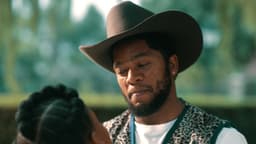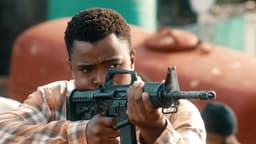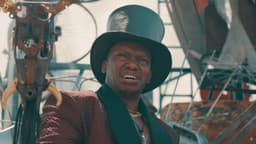
Happy Face and the monster at home
At the age of 16, Melissa Jesperson-Moore found out that her father, Keith Hunter Jesperson, had a secret identity. He wasn’t a spy, or a superhero. He was a serial rapist and murderer. Keith earned the nickname the Happy Face Killer from his habit of anonymously confessing to (or boasting about) his crimes by sending messages to a newspaper that he signed with a smiley face symbol. A new crime drama series, Happy Face, reimagines Melissa’s story, drawing on her 2009 autobiography Shattered Silence, along with the 2018 podcast she hosted, titled Happy Face by Melissa Moore.
The series starts with Keith (Dennis Quaid) blackmailing Melissa (named Melissa Reed in the series and played as an adult by Annaleigh Ashford) to visit him in prison. He promises to reveal his ninth victim by giving Melissa a series of clues, linking the murder to some events in her childhood.
It’s a dramatic opening act that puts a falsely accused man’s life on the line, gives Melissa a season-long case to work on, and drops the serial killer grandpa bomb on Melissa’s 15-year-old daughter Hazel (Khiyla Aynne), threatening to repeat Melissa’s trauma in a new generation. Happy Face tackles Melissa’s adult life in a series of “what ifs”. What if Melissa had never written her book? What if she had kept her secret? What if she went back to see her father in prison?
Binge Happy Face now on Showmax
Written nine years apart, both the book and the podcast were part of Melissa’s efforts to not just process her own questions but to reach out to other families and children who felt tainted by the monster in their homes. It wasn’t something she had even thought of doing until her young daughter asked Melissa where her daddy was. The day that she realised that it was going to be worse to keep their family’s secret and lie to her child, than it would be to talk about it on her own terms, Melissa started writing. And she created the book she wished that she’d had while she was growing up.
After writing Shattered Silence, Melissa started a press tour, during which she began corresponding with the wives, siblings, parents and grandparents of serial killers who reached out after seeing her speak on talk shows like Oprah. She spoke with their children, young and adult, who’d been asked to live with crushing shame and secrecy because a grownup in their house had committed crimes. Melissa described some of their shared feelings in an article she wrote for the BBC: “I ended up feeling that I had to pay restitution for his crimes. I felt dirty, I felt less of a person, I felt isolated, I felt alone. I used to think that I couldn't live in this world and be a part of it. I would always be a spectator, watching normal people go about their lives.”
By 2014, Melissa had spoken to 300 people who’d had similar experiences and felt haunted by the same questions as her. And she started approaching the families of her father’s victims, along with the only survivor of his attacks. She learned about their lives to honour their memories, and she sat through the agony of listening to what her father had done to them so that she could chip away at her image of the man who’d raised her – the Disneyland Dad who’d scoop up his children and take them on fun adventures.
In reality, Melissa has not visited her father in prison since 2008, when he wrote to her following the publication of her book. She revealed in her BBC article, “I got a letter from him in which he said, ‘I don't want the world to judge me as a dad. I was a great dad. My only mistake was my eight errors in judgement.’" It was yet another shocking eye-opener for Melissa who asked, “How can anyone – even someone as close as a daughter– continue to have a relationship with a person who so completely lacks honesty and compassion?”
That’s one of the big questions people close to people who’ve committed atrocities struggle with. Because where does all that love go? Aside from Melissa’s story, we can look at three other series and movies that centre on this search for answers.
The Commandant’s Shadow

In this documentary film, 80-year-old Hans Jürgen Höss, the son of Rudolf Höss, the Camp Commandant of Auschwitz, visits his childhood home, a villa right next door to the camp – a house he remembered as a childhood paradise filled with flowers and games with his young siblings. Like Melissa, Hans meets with one of his father’s victims, Auschwitz survivor Anita Lasker-Wallfisch. And like Melissa, he confronts his memories of his father along with his child, his son Kai Höss, as they listen to Anita and her own daughter, Maya.
Hans and Kai’s respectfulness and openness, along with their obvious sorrow and compassion over Rudolf Höss’s dehumanising violence is a balm to Anita, who calls their encounter “beautiful”, and tells Hans, "You weren't asked whose son you want to be".
But as we meet the other members of Hans’s family, we realise that they don’t share his willingness to open their eyes to the horror in the heart of their home. In the documentary, filmmaker Daniela Volker reveals that even Hans’s ability to come to terms with the reality of his father and his childhood is a recent, deeply painful and scarring process – one that he only started working on after he read the manuscript of Rudolf Höss’s confessional memoir and (again, like Melissa), could no longer turn away from the nature of his father’s crimes.
Baby God
Las Vegas gynaecologist Dr Quincy Fortier spent 40 years “helping” women with fertility issues and treating women for a range of gynaecological issues. But behind the scenes, “fertility specialist” Fortier was helping himself, impregnating patients with his own sperm. One such victim was Connie Fortier, who was just 18 years old and a virgin when her adoptive father, Quincy, deliberately secretly impregnated her during a gynaecological exam. Then he sent her away to a home for unwed mothers. While two of his children staunchly stand by their father, dismissing the evidence of his crimes, his son Quincy Junior actually tried to sue him for sexually abusing him and his siblings when they were children.
The truth only came out when retired police investigator Wendi Babst decided to take an online DNA test. The results connected her with other children born thanks to Fortier’s deception, including half-brother Mike Otis, half-brother Brad Gulko (a DNA researcher), and more than 20 other half-siblings. In this documentary they all talk about how they’re coming to terms with the identity of their biological father, who went to his grave at the age of 96 without ever having to face exposure for his crimes.
Baby God shows how Fortier’s biological children are battling to adjust to knowing who their father is and what that means for them, along with the knowledge that he became their father through abusing their mother’s trust. Brad Gulko admits that he’s struggling with the mental gymnastics that Fortier performed to justify his crimes to himself.
At the time Baby God was filmed, Fortier was just one of around 24 fertility specialists in the US who’d been exposed for fertility fraud. If there was ever proof to criminals’ children that you don’t pick your parents, this is it.
Original Sin: My Son the Killer
In 2011, South African Gerhard Jansen van Vuuren murdered his 25-year-old ex-girlfriend Andrea Venter in front of her neighbours, security guards and CCTV cameras, defying a restraining order along with all her attempts to keep him out of her life, including moving cities. He stabbed her repeatedly, then slit her throat out in the open – in front of her complex’s horrified security guard Thulani Ndlovu – when she tripped while running to his guard house. Gerhard threatened Thulani with a knife as he locked himself in the guard house and phoned for help.
But in the face of overwhelming evidence against Gerhard, just before he was due to stand trial on 20 May 2013, his mother, Thea Pretorius, helped him to flee the country, despite seeing the literal blood on his hands and her absolute certainty that he’d killed Andrea. In this true-crime documentary, Thea, a survivor of domestic violence herself, grapples with both her choice to help Gerhard, and her role, as his mother, in raising a son who continued the violence in their home.
“It just felt like an atom bomb had exploded inside of me”, she admits, stating that she knew Gerhard hated her because he believed she (Thea) had thrown him away. While former SAPS head profiler Dr Gérard Labuschagne explains the deadly nature of gender-based violence, Thea talks about the ongoing struggle it has taken to get to the point where she can admit, “He’s capable of worse things … he’s a killer.”
Five Happy Face questions to keep you up at night
1. Were there signs that there was something off about Keith Hunter Jesperson?
Very much so. Melissa remembers that when she was just five years old, she begged and screamed at her father to let her kittens go and stop torturing them, but he seemed to enjoy both their pain and her tears. And the kittens weren’t the only pets he tortured in front of his kids.
2. Did he ever drop hints to Melissa about his crimes?
Yes. When Melissa was 13 years old, her father took her on a drive along the Columbia River when, out of the blue, he boasting that he knew how to kill a person and get away with, describing how he’d do it, down to cutting the buttons off their clothes so the police couldn’t find fingerprints on them. Years later, she realised that they were passing through the area where he’d dumped the body of his first known victim, Taunja Bennett.
3. Did he ever try to directly tell Melissa what he did?
Just before he was arrested, Melissa reveals that her father hinted that he wanted to tell her his big secret. She thought that he was going to confess to being a smoker until he told her, “If I tell you, you will tell the police. I'm not what you think I am, Melissa." He then backed out of confessing.
4. Was her father going to kill her, too?
This question haunted Melissa while she was growing up. But while writing her book, she was chatting to her grandfather when he revealed that he’d been to see Keith in prison, and Keith admitted to weighing up killing all his children, too. Melissa told the BBC that the revelation set her free. There was no good daddy Keith and bad killer Keith. There was always just a killer with a mask on and off.
5. What would Keith have done if Melissa found him out?
Her grandfather’s revelation also answered another question for Melissa. To her mind, there was no doubt that he would have killed her the moment he realised that she knew, rather than risk her going to the police.
More like this

The Neighborhood S1-8
When Dave Johnson and his family arrive from Michigan, they're unfazed that their new dream home is located in a community quite different from their previous small town.

Pearl Modiadie steps into her power in Law, Love and Betrayal S2
Pearl Modiadie talks about stepping into power as Ayanda in Law, Love and Betrayal S2, premiering 8 March on Mzansi Magic and 9 March on Showmax.

Bad Girls Bootcamp S1
A group of rebellious young girls are put through a reality-themed boot camp by their families. These ladies face multiple challenges intended to moderate their behaviours for a better life.

Jojo on The Real Housewives Ultimate Girls Trip: Africa reunion, social media backlash and more
Jojo opens up about the highly anticipated reunion for The Real Housewives Ultimate Girls Trip: Africa, coming to Showmax on 20 and 27 February.

South Africa’s stories and storytellers recognised as SAFTA nominees announced
Mzansi’s boldest stories take centre stage as the 2026 SAFTA nominees are unveiled, with a wave of nominations across DStv and Showmax.

The ‘Burbs S1
In this adaptation of the 1980s Tom Hanks dark comedy, a couple moves back to the husband's hometown, only to face a cul-de-sac shrouded in mystery.

“You don't create something so powerful purely through military tactics” - Shaka iLembe co-creator
Shaka iLembe co-creator Desireé Markgraaff reflects on the vision, research, and importance of telling our stories. Stream Seasons 1–2 on Showmax.

Where to see the cast of Shaka iLembe S1-2 on Showmax
From Nomzamo Mbatha as Queen Nandi to Lemogang Tsipa as King Shaka Zulu and Thembinkosi Mthembu as King Dingiswayo, see the cast of Shaka iLembe in some of their other acclaimed roles on Showmax. Binge now on Showmax.
Outlaws, now streaming on Showmax
Go on holiday with RHUGT: Africa
More Originals you'll love

Must-watch trailer: The People vs VBS explores South Africa’s biggest bank heist
The People vs VBS is IdeaCandy's true-crime docuseries on South Africa’s biggest bank heist. On Showmax from 25 March and on M-Net from 2 April.

Brakpan Chronicles S1
What is true about the town of Brakpan and what is fiction? Do the jokes about this place have any basis in reality? In this two-part documentary, we aim to find the real Brakpan, the place that exists beyond the memes.

Pearl Modiadie steps into her power in Law, Love and Betrayal S2
Pearl Modiadie talks about stepping into power as Ayanda in Law, Love and Betrayal S2, premiering 8 March on Mzansi Magic and 9 March on Showmax.

Jojo on The Real Housewives Ultimate Girls Trip: Africa reunion, social media backlash and more
Jojo opens up about the highly anticipated reunion for The Real Housewives Ultimate Girls Trip: Africa, coming to Showmax on 20 and 27 February.
Latest Stories

What to watch on Showmax in March 2026

Bad Girls Bootcamp S1

Nhlanhla Kunene confirmed for Law, Love and Betrayal Season 2

Christall dishes on The Real Housewives Ultimate Girls Trip

Brakpan Chronicles: Die mense sê, kom in

Schalk Bezuidenhout trades stand-up for 9-5 in Die Kantoor

A heartbreaking loss: Nolwandle Biyela’s final stand in Outlaws Season 2

Fall in love with romantic drama Touch, now on Showmax

Antonie Marx on Volspoed and why it's a must-watch

Sandra Stein makes her debut on Law, Love and Betrayal S2

Albert Pretorius on Die Kantoor, SA’s re-imagining of The Office

20+ addictive South African reality shows to stream

Where to watch The Real Housewives franchise online

How to Train Your Dragon: Bringing Hiccup and Astrid to life

What to watch on Showmax in January 2026

7 things to know about indie award-winning movie Dìdi

Mission: Impossible – The Final Reckoning’s South African stunts

Die Kwiksilwers (2024)

Where to see the cast of Mpondoland on Showmax

Angel on The Real Housewives Ultimate Girls Trip, Jojo and more

Thandolwethu Zondi on his new role in Outlaws S2
Must-watch trailer for Showmax's turbo-charged reality series Volspoed

The Real Housewives Ultimate Girls Trip cast on first impressions, beefs and more

Fana Mokoena on playing a sangoma in Masinga







